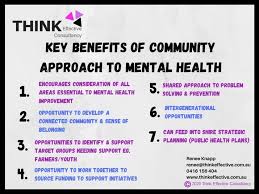Sometimes, you can feel alone even when people are around. It’s hard to explain, but that feeling is real. You wake up, go about your day, and it feels like no one truly sees you or understands what you’re feeling. This is where community matters. Having a few people who care, check in on you, or simply sit and talk with you can make a huge difference. It reminds you that you’re not alone.
In this article, we’ll explore why being part of a community is essential for mental health and emotional well-being.
Feeling Like You Belong
Humans need to feel like they belong. Whether you’re a student, parent, remote worker, or retired, being part of a group gives your mind peace. Feeling connected to others creates a sense of purpose and security.
It doesn’t need to be a big group. Even a morning coffee circle, a religious community, or a small friend group can provide support. These people don’t have to fix your problems. Simply knowing they’re there, remembering you, and checking in on you is enough to make you feel safe.
As Marissa Burrett, Lead Designer at DreamSofa, says, “Loneliness doesn’t always mean being alone. You could be in a crowd and still feel invisible. But when you truly belong somewhere, that feeling starts to fade.”
Talking to Someone Eases the Weight
Bottling up feelings increases pressure and overthinking. When you talk to someone—even if they don’t offer advice—it helps lighten the emotional load. Speaking out loud helps you understand your emotions and reminds you that you’re human, not broken.
A good community—friends, family, neighbors, or online groups—provides a judgment-free space. You can say, “I’m not okay,” and be heard. That safe environment is deeply healing.
Reminders That You Matter
Feeling seen and valued is vital for mental health. Psychologist Vladimira Ivanova from The Diamond Rehab Thailand explains, “When people check in, remember your birthday, or ask how your day was, it reminds you that you matter. Even small gestures can restore a sense of worth when you’re struggling.”
Being part of a community gives you a sense of contribution. You’re not just existing—you’re adding to the lives of others. That connection changes how you see yourself, reinforcing that you’re important and valued.
Building Healthier Habits
Daily routines and mental health go hand in hand. Loneliness can lead to unhealthy patterns like skipping meals, staying in bed, or neglecting self-care. Being part of a supportive community encourages healthier behaviors.
Htet Aung Shine, Co-Founder of NextClinic, explains that simple actions like someone inviting you for a walk or checking if you’ve eaten can motivate you to take care of yourself. Over time, this social encouragement fosters better habits and a more active, engaged life.
Support During Tough Times
Life inevitably brings challenges—loss of a job, health issues, or emotional lows. In these moments, community support can make a world of difference.
Even small gestures, like checking in, bringing food, or helping with chores, remind you that you’re not alone. Sometimes, simply having someone sit quietly with you is enough to help you get through the day. A strong community shows up when it matters most.
Breaking the Silence Around Mental Health
Mental health struggles are often hidden due to stigma or fear of judgment. Being part of an open, supportive community makes it easier to talk about challenges.
Sinead Corceran, Yoga Trainer and Course Director at All Yoga Training, notes that sharing experiences encourages others to speak up as well. Open conversations about mental health foster understanding, kindness, and support, creating a safe space where people don’t have to hide their struggles.
Conclusion: Connection is Healing
Feeling better starts with feeling connected. You don’t need a large group or an active social life. Even one or two people who genuinely care can make a meaningful difference.
A strong community may not fix everything instantly, but it provides stability, encouragement, and a sense of belonging. If you’re struggling, reach out. Join a small group, message someone you trust, or simply be present with others. And when someone else needs support, show up for them. These small, consistent steps can create real change—for your mental health and for those around you.





